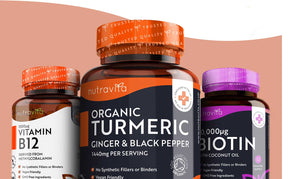
What Is Biohacking and Does It Actually Work?
In the vast and enthralling world of personal health, one trend is taking centre stage - biohacking. But what exactly is biohacking, and more importantly, does it really work?
Biohacking, or 'do-it-yourself biology', is a broad term encompassing a wide spectrum of activities, all designed to 'hack' or improve your body's natural functions. The goal of biohacking is to optimise health, well-being, and performance, with attention to biometric data to guide the process.
Yet, the question remains ― does this intersection of biology and DIY altering produce real, measurable improvements?
The Science Behind Biohacking
Biohacking is all about optimising your life and body function through science and self-experimentation. It's about taking full control of your biology.
To put it simply, biohackers use a mix of medical, nutritional and electronic techniques to improve their bodies and brains. Some biohackers focus on modifying their bodies to enhance physical or intellectual performance. Others take a more holistic view, aiming to take charge of their health or slow the ageing process.
The science behind biohacking is vast and complicated, it covers fields such as neuroscience, biology, psychology, and even computer engineering. One popular form of biohacking, for example, involves manipulating your own genome or DNA to achieve a desired outcome. This could range from slowing the ageing process to enhancing physical or cognitive abilities.
Biohackers commonly utilise techniques that include everything from implanting microchips into their bodies, to taking supplements, or altering their sleep and dietary habits. Some biohackers have even gone as far as self-implementing prosthetic devices to enhance their senses or abilities. The overall goal is always to make improvements to your body, your mind, and your life.
But does it really work? Like any science, biohacking's effectiveness depends heavily on the individual and the specific biohacks they choose to implement. In addition, it should come as no surprise that biohacking comes with its own set of risks and is, at times, subject to scepticism. At its core, however, biohacking continues to grow because of the simple and irresistible human desire to become the best version of oneself.

Biohacks to Try
When it comes to trying out biohacking, there's a multitude of tactics you can incorporate into your routine. While the effectiveness of these methods varies from person to person, they all share a common goal: to optimise health and performance. Here are a handful of biohacks you might want to consider:
Intermittent Fasting
Intermittent fasting isn't just a trend—it's a time-honoured biohack dating back centuries. By designating specific time frames for eating, you can align your feeding windows with your body's natural circadian rhythm. This can help manage weight, improve mental clarity, and possibly even extend lifespan. However, please consult with a healthcare professional before starting any new dietary regimen.
Cold Water Baths
The practice of immersing oneself in cold water, or cryotherapy, is another favourite biohack. Cold water baths kickstart the body's survival mechanisms, increasing metabolism and accelerating recovery from physical exertion. Enthusiasts claim it boosts mood and enhances focus. But remember, always start small and increase the cold exposure gradually to avoid cold shock.
Supplements
Supplementation forms a cornerstone of biohacking, as it allows you to take control of your nutrient intake. From standard vitamins and minerals to more exotic compounds like nootropics, biohacking supplements uphold your body's functional integrity and optimise performance. Key among these are Omega-3 fatty acids, Vitamin D, Magnesium, and probiotics.
Omega-3 Fatty Acids: Notoriously associated with fatty fish like salmon and sardines, Omega-3 fatty acids are revered biohacks, contributing significantly to the body's optimal functionality. They support brain health, reduce inflammation, and may even boost mood. By augmenting their consumption, biohackers aim to sharpen their mental acuity and increase overall wellness.
Vitamin D: Often called the "sunshine vitamin," Vitamin D plays a crucial role in maintaining bone health and bolstering immune systems. Modern lifestyles often lead to deficiency of this essential nutrient, hence supplementation becomes a potent biohack. The ultimate goal here is to remedy deficiencies and promote greater resistance against disease.
Magnesium: A mineral commanding over 300 biochemical reactions in your body, from nerve function to energy metabolism, obtaining adequate magnesium is essential in biohacking. With it, biohackers not only seek to ensure smooth body operation but also aim to enhance energy levels and improve sleep quality, further boosting daily output.
Probiotics: As science continues to underscore the profound interplay between gut health and overall well-being, probiotics have risen to prominence in the context of biohacks. These beneficial bacteria support digestion, assist in nutrient absorption, and even impact mental health.

In all, these specific supplements underscore why supplementation is regarded as a cornerstone of biohacking. It's not simply about ingesting extra pills; it's a calculated approach leveraging nutrition and science to push the body's boundaries, optimise health, and potentially improve quality of life.
Light Therapy for Circadian Rhythm Regulation
This biohacking technique revolves around exposing the body to specific types of light at particular times of the day to regulate the body's internal clock, or circadian rhythm.
Our internal clock is responsible for many of our bodily functions like sleep and wake patterns, hormone secretion, and even body temperature. Disruption of this internal rhythm may cause a slew of health problems including irregular sleep, mood disorders, and a hampered immune system.
So how does light therapy work? Bright light therapy typically involves sitting or working near a device called a light therapy box. The box gives off bright light that mimics natural outdoor light and has been touted to influence the body's circadian rhythms, effectively helping to spur alertness and energy during the day, while fortifying your dose of essential sleep at night.
It doesn't stop there. There's a growing body of research suggesting that strategic exposure to specific wavelengths of light at different periods can also aid in managing a variety of conditions, from seasonal affective disorder (SAD) to some sleep disorders, and even jet lag.
Timed Caffeine Ingestion
This concept revolves around harnessing the power of caffeine by timing its consumption precisely, to maximise the benefits.
Caffeine is a natural stimulant most commonly found in tea, coffee, and cacao plants. To biohack your energy levels, one could time their consumption of caffeine to sync with the body's natural circadian rhythm. For most people, cortisol levels which help us wake up and feel alert, peak at around 8 to 9 a.m., noon to 1 p.m., and 5:30 to 6:30 p.m. By drinking your cup of coffee outside these times, say, 9:30 a.m. and 2 p.m., you can keep your energy levels consistent throughout the day without disrupting your cortisol production.
Researchers have suggested that precise timing of caffeine ingestion could enhance cognitive performance, boost physical endurance, and improve mood. While it's accurate to say there's more research needed to fully understand the long-term effects, strategic caffeine intake seems beneficial and has been widely adopted among biohackers.
But like all biohacks, it's essential to remember that the ideal timing for caffeine consumption might vary from person to person, based on factors like genetic makeup, lifestyle, and tolerance. So experiment, pay attention to how your body responds, and adjust accordingly. Happy Biohacking!

Riya Lakhani-Kanji MSc ANutr is a registered nutritionist and health writer with a special interest in plant-based nutrition. She has completed a Bachelor’s and Master’s degree in Human Nutrition, and has developed a passion for writing about all things plant-based.




